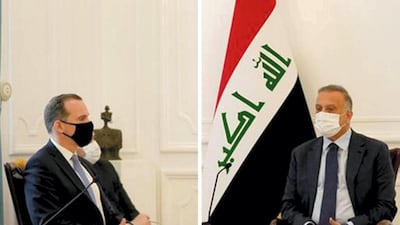A US delegation in Iraq discussed American troop presence and the status of strategic talks in meetings with Prime Minister Mustafa Al Kadhimi and President Barham Salih.
The meetings come as the US and Iraq discuss the future of relations and the future of the 2,500 US soldiers based in Iraq to support the fight against ISIS.
Mr Al Kadhimi met the delegation headed by US National Security Co-ordinator for the Middle East and North Africa Brett McGurk to discuss “co-ordination and co-operation in various fields”.
The meeting “emphasised implementing the outcome of the strategic dialogue between Iraq and the US, especially with regard to the withdrawal of combat troops from Iraq”, to the Iraqi PM's office reported.
Mr Al Kadhimi, who previously ran the Iraqi National Intelligence Service, worked closely with Mr McGurk when he was the US envoy to the international coalition against ISIS.
During his visit, Mr McGurk met President Barham Saleh and Parliamentary Speaker Mohammed Al Halbousi.
The Iraqi officials highlighted the importance of enhancing relations between Baghdad and Washington with Mr McGurk's delegation.
Mr Saleh told Mr McGurk that his country is "embarking on a balanced policy that will defuse tensions in the region".
"Iraq's distinguished geographical location represents a pivotal factor in facing challenges related to terrorism and enhancing stability in the region," Mr Saleh said during the meeting.
Mr McGurk's meeting with Mr Al Halbousi discussed "co-operation between the US and Iraq in the security, economic, cultural and health sectors in light of combating the coronavirus pandemic" the Iraqi news agency, INA, reported.
Mr Al Halbousi said that Washington must support Baghdad's security and stability.
Last year, a parliament bill ordered America to pull all its forces from Iraq following the killing of Iranian general Qassem Suleimani near Baghdad airport last January.
The officials also spoke about the "importance of activating the outcomes of the strategic dialogue".
Mr McGurk expressed the United States' continued support for "Iraq, and its commitment to the strategic partnership to ensure they work together for a strong, sovereign Iraq".
The US group is the largest and highest-level delegation from President Joe Biden's administration to visit the region since he took office on January 20.
As well as Mr McGurk, State Department counsellor and undersecretary Derek Chollet, Acting Assistant Secretary for Near East Affairs Joey Hood, and the head of the Middle East desk at the Pentagon, Dana Stroul, joined the delegation.
The US and Iraq are in strategic dialogue to discuss the future of relations. The meetings began under former president Donald Trump last June and the first round of talks under the Biden administration were held last month.
A joint statement after the most recent talks said the US will move its remaining combat troops out of Iraq.
The visit came after three attacks on bases hosting American forces in as many days.
Two rockets hit an unoccupied area of the Ain Al Assad airbase in the Anbar province on Tuesday, "without causing damage or casualties", the Iraqi army said.
The attack followed a similar rocket strike against an airbase at Baghdad airport housing US-led coalition troops on Sunday night and another against Balad airbase, which hosts US contractors, north of the capital on Monday night.
None of the attacks have so far been claimed, but Washington blames Iran-linked Iraqi Popular Mobilisation Forces, government-sanctioned paramilitary forces, for repeated attacks on its troops and diplomats.
Pro-Iran Iraqi groups have vowed to increase attacks to force out the US forces since Suleimani's killing.
AFP reported that since Mr Biden took office in January, about 30 rocket or bomb attacks targeted American interests in Iraq, including troops, the embassy or Iraqi supply convoys to foreign forces.
Two foreign contractors, one Iraqi contractor and eight Iraqi civilians were killed in the attacks.
Last month, an explosives-packed drone hit Iraq's Erbil airport in the first reported use of such a weapon against a base used by US-led coalition troops in the country.


